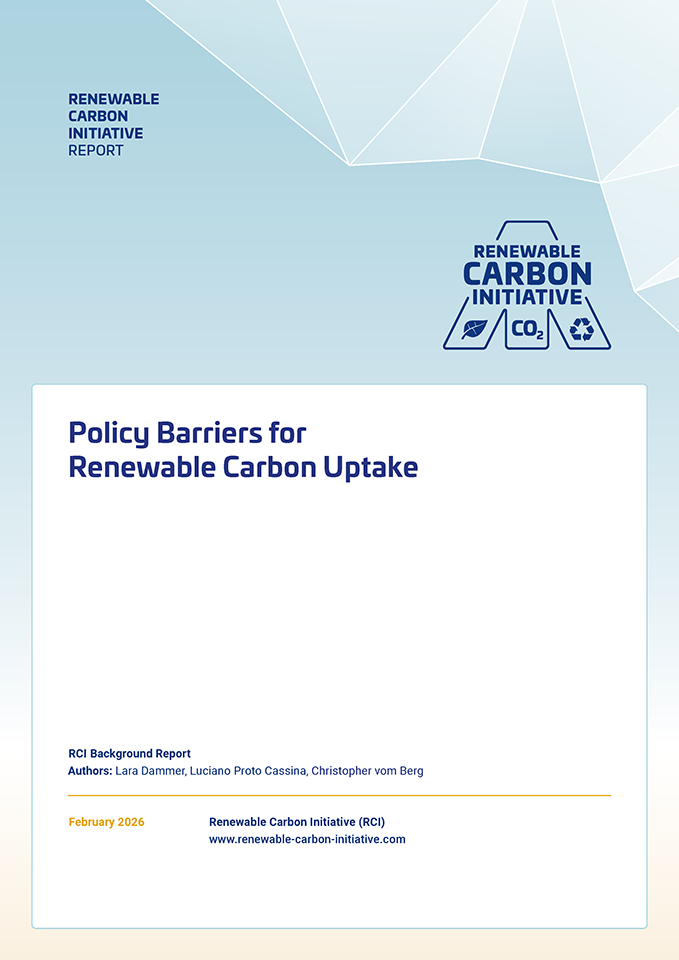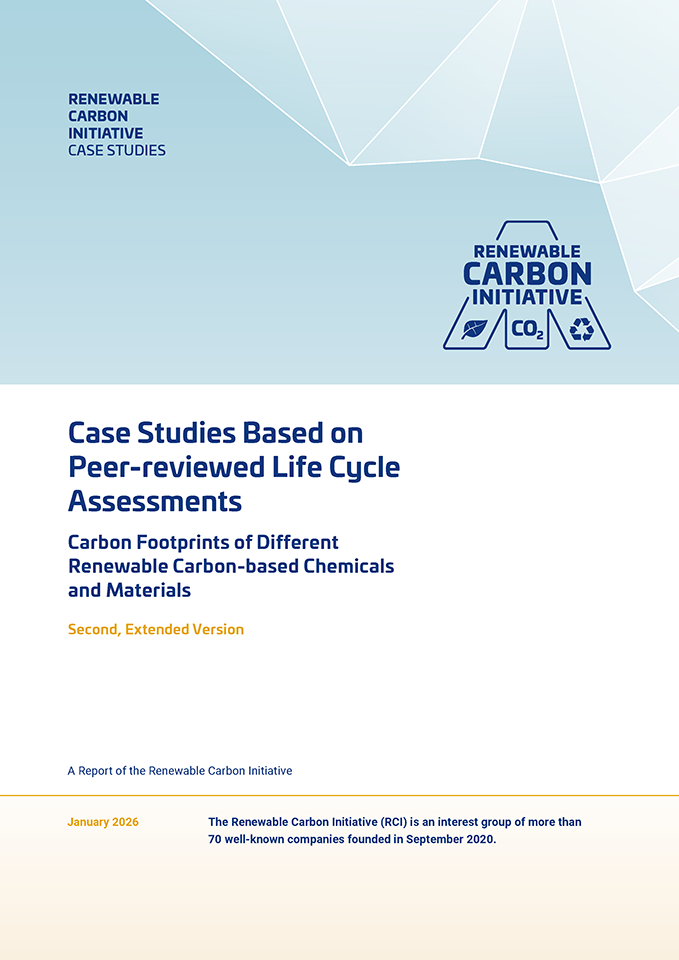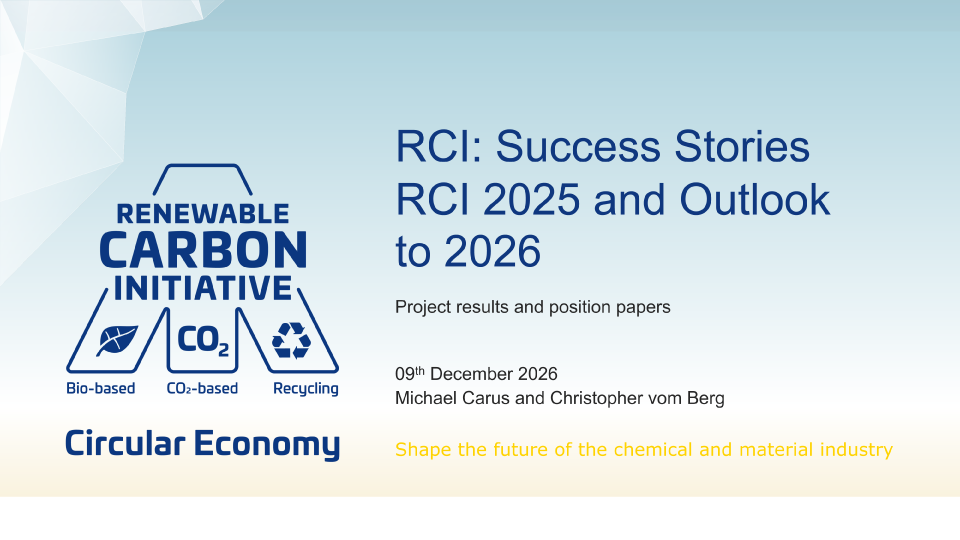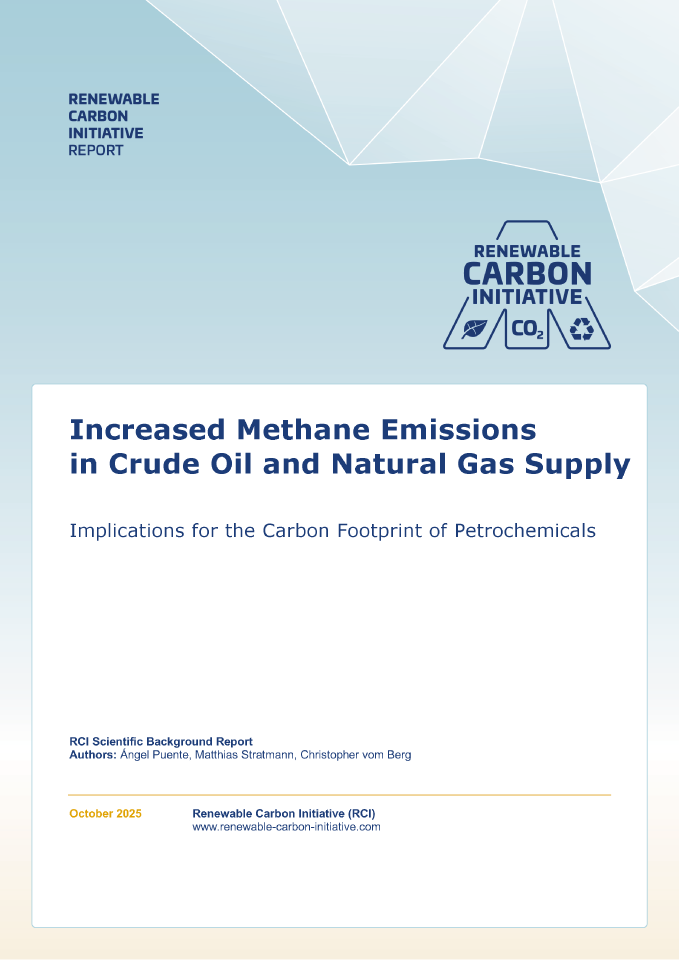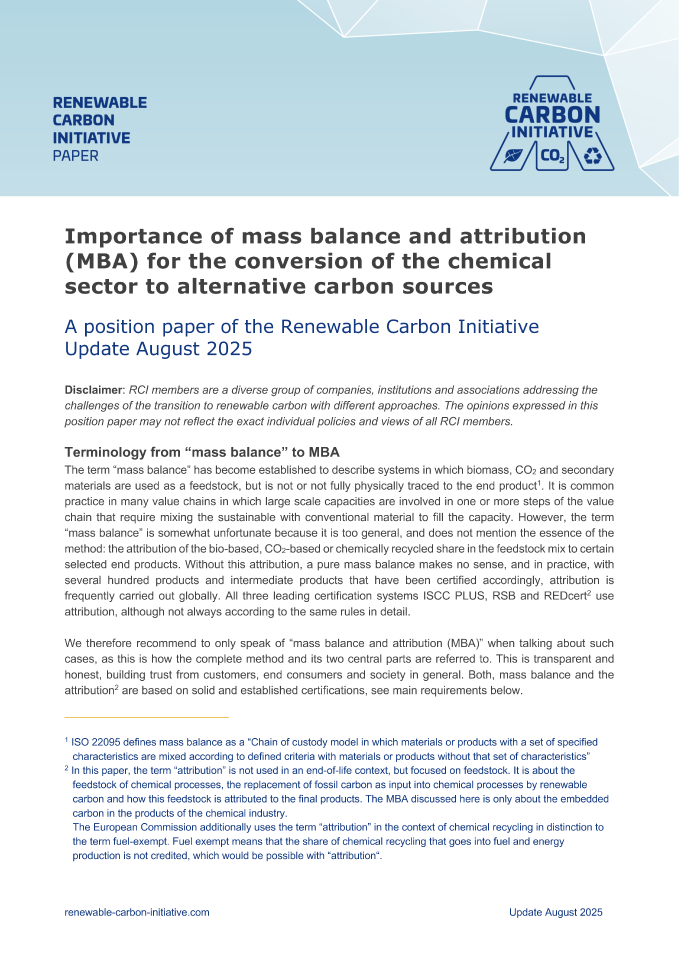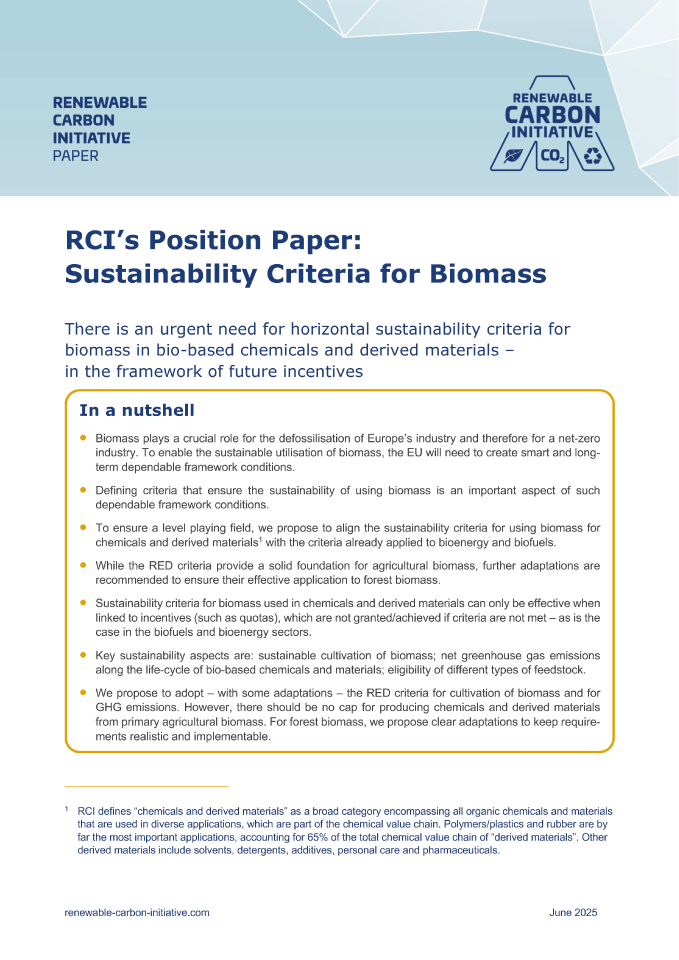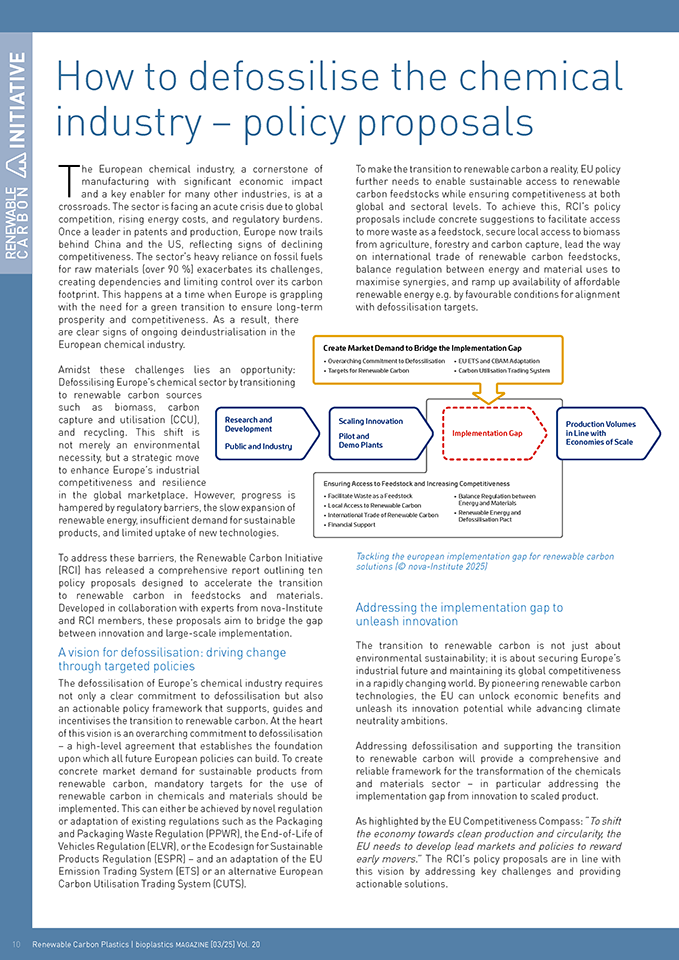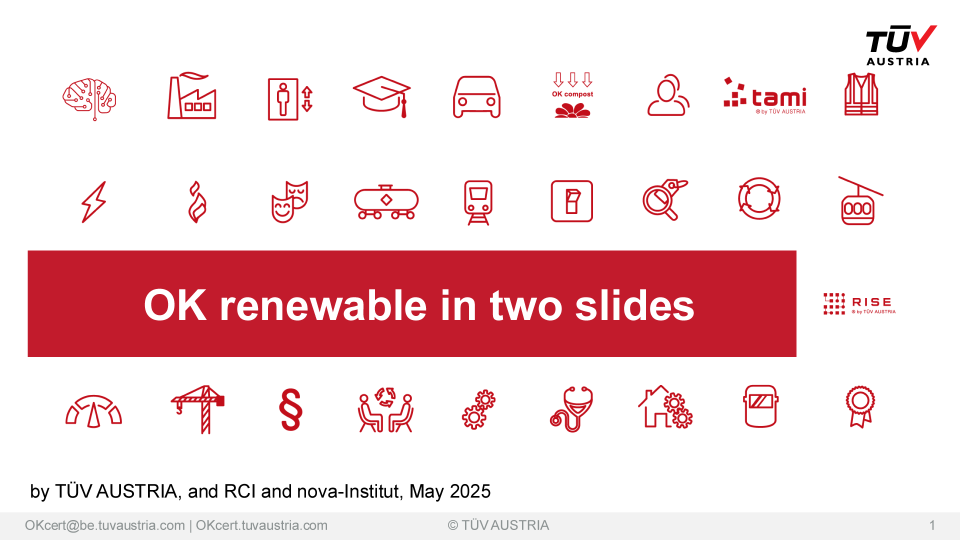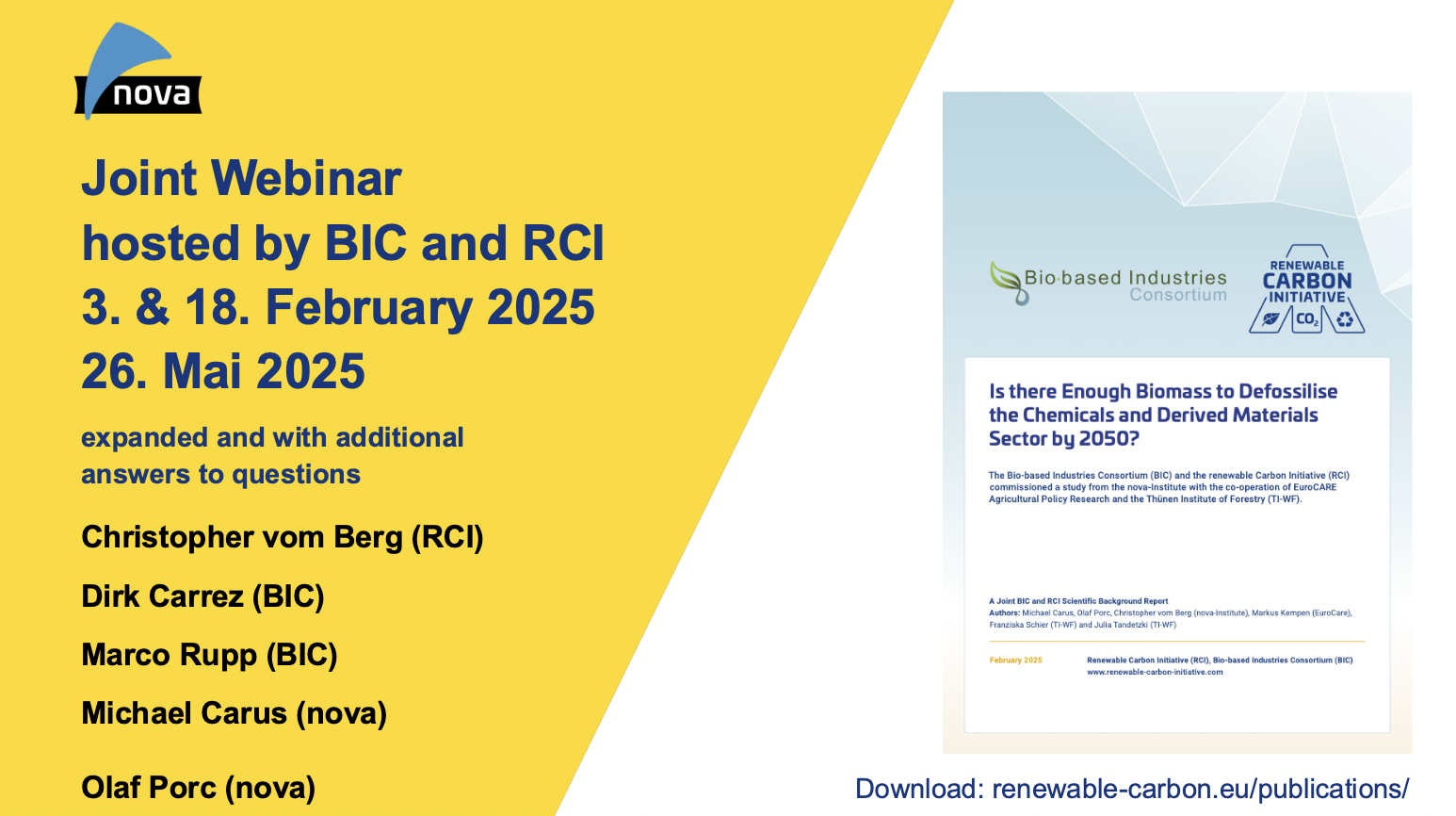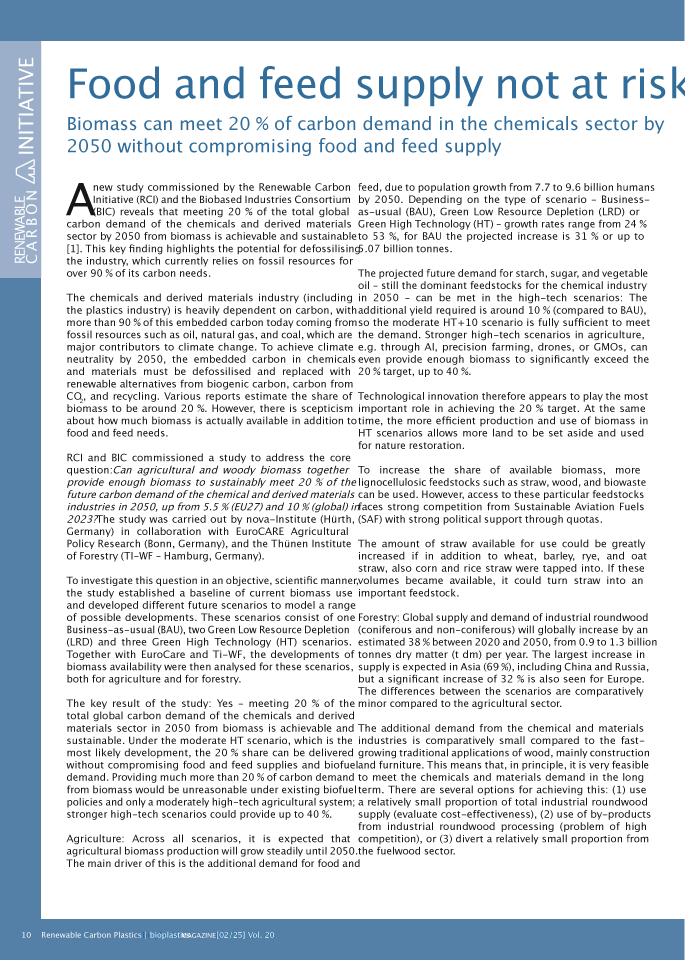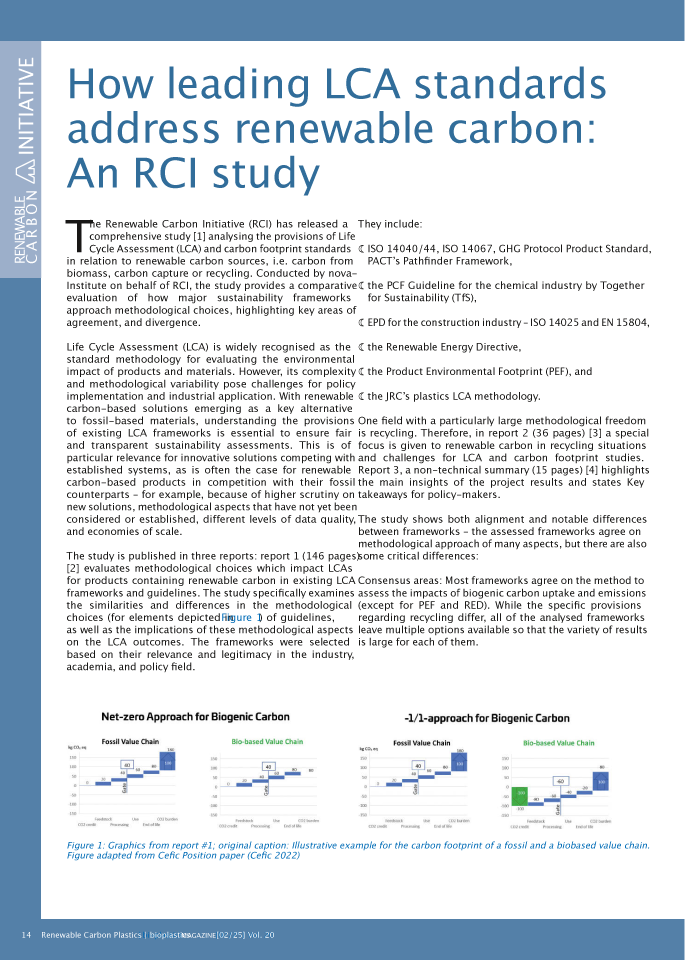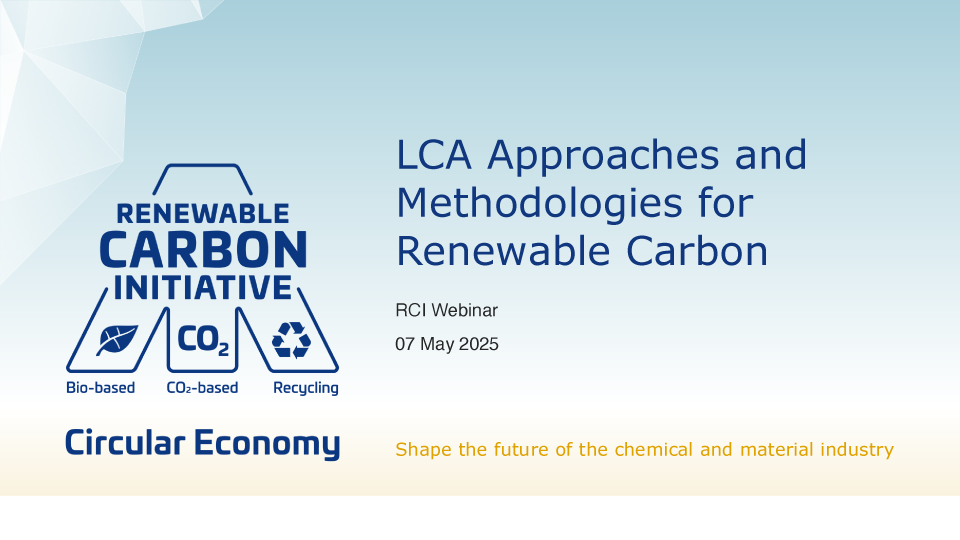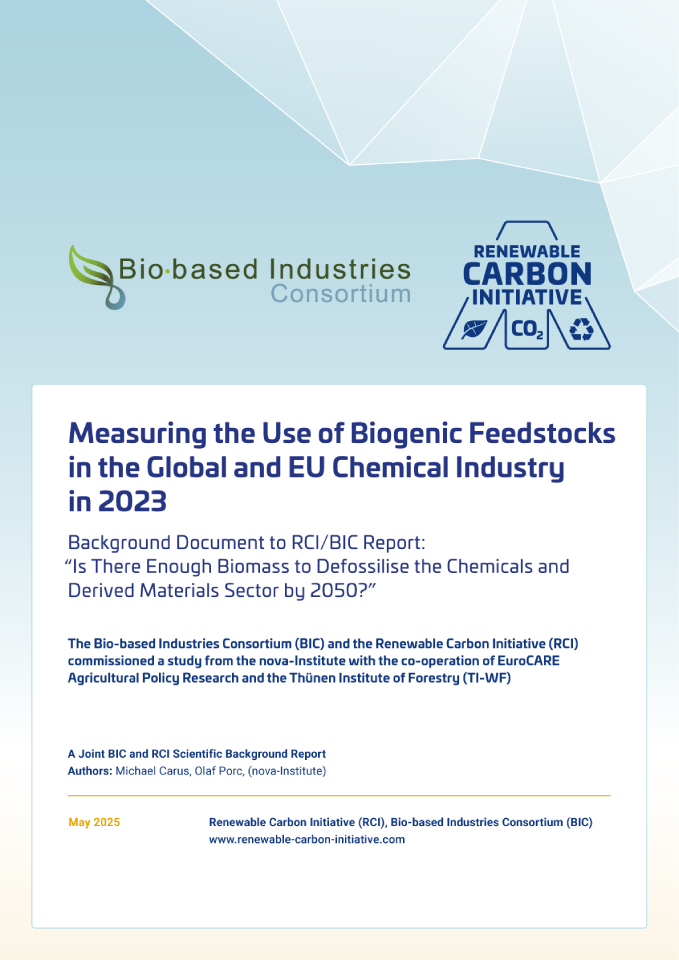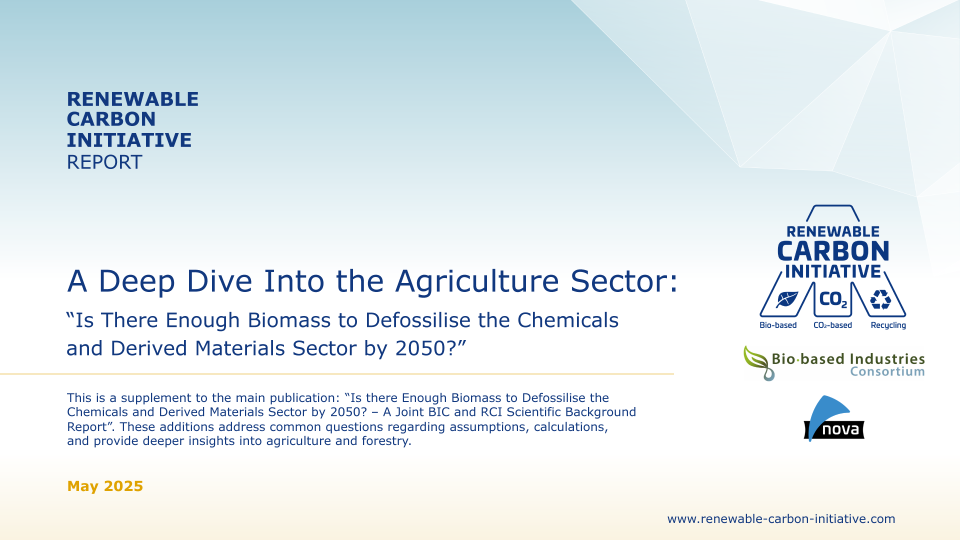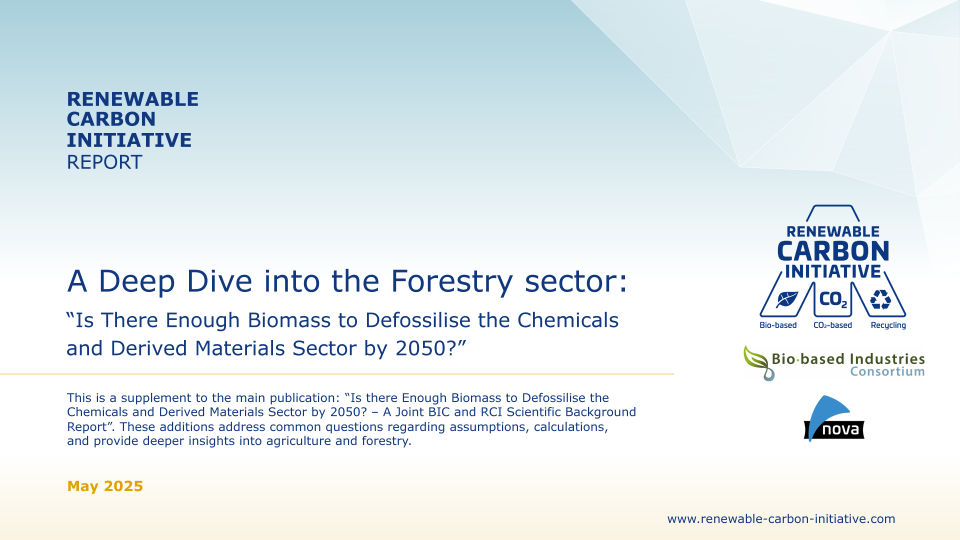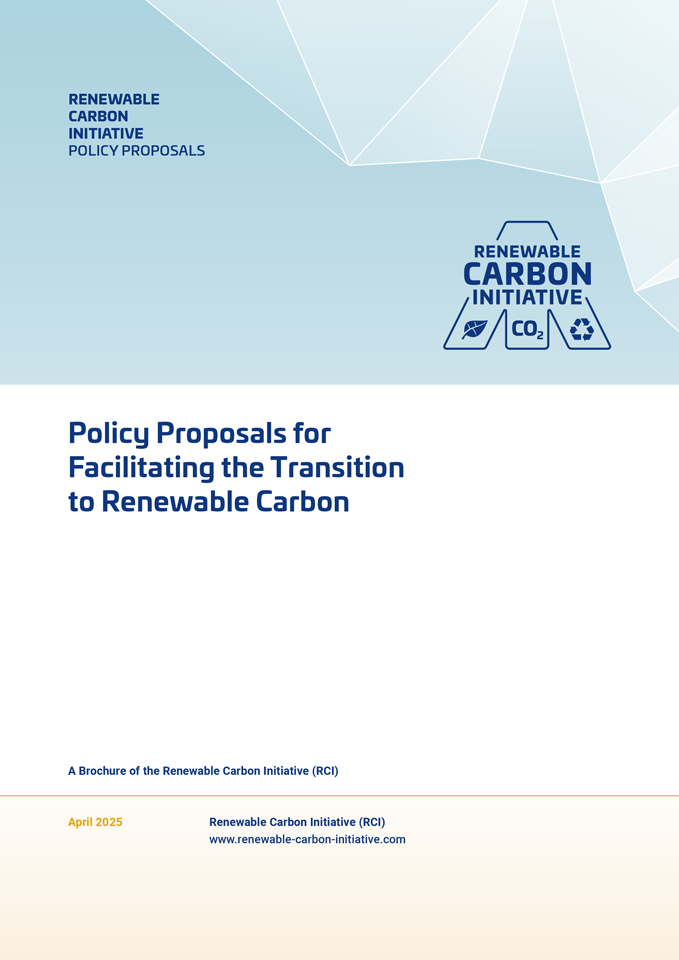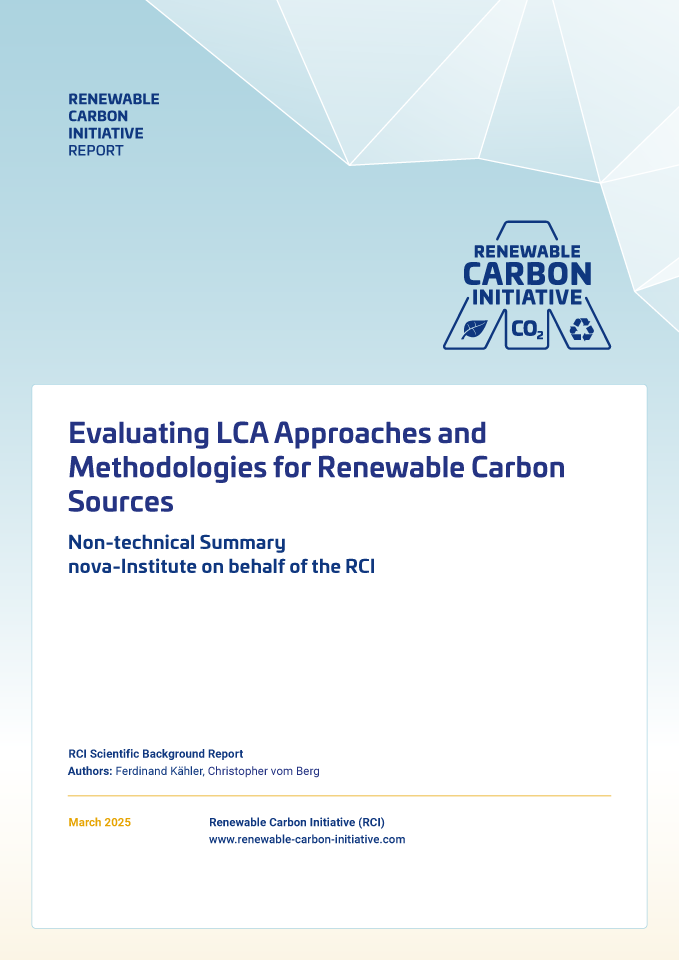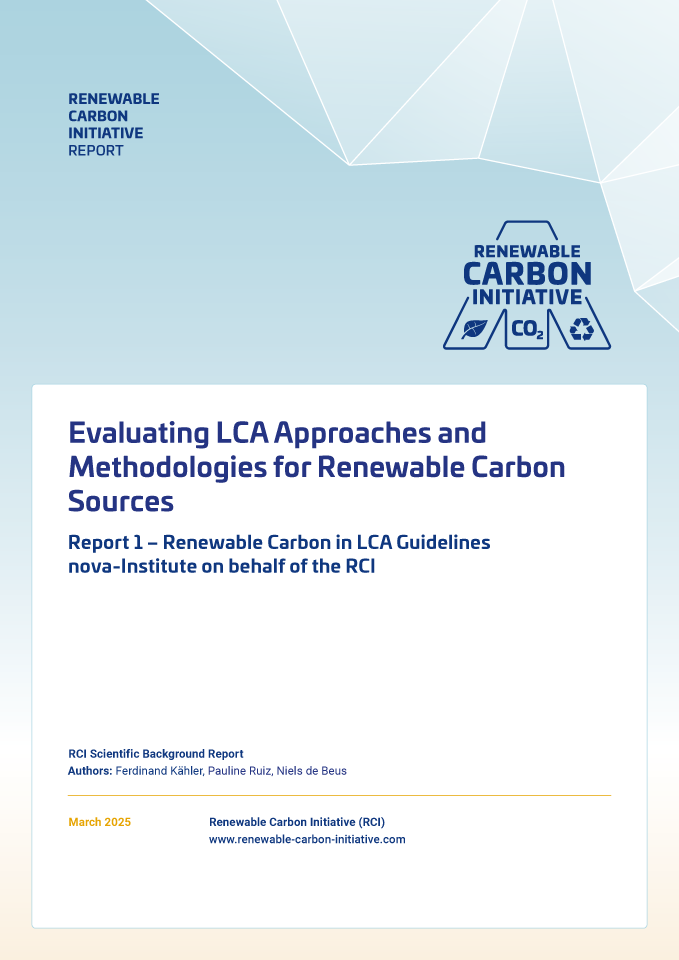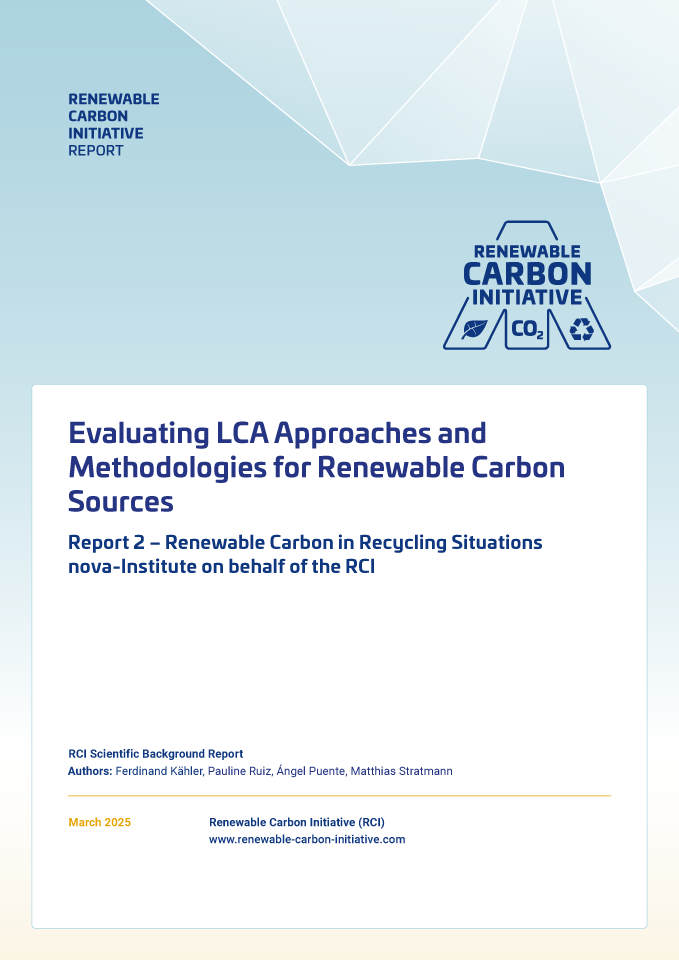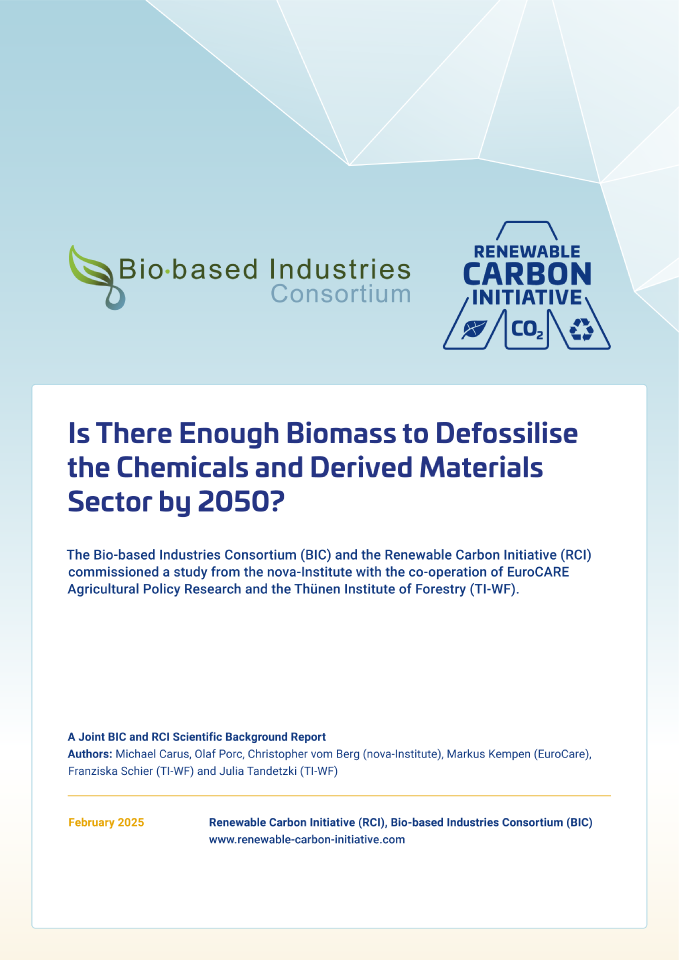Showing 1–20 of 60
-
33 Downloads
2026-02
FREE
Free Shipping33
DownloadsBased on internal assessment of RCI member companies and joint analysis, this report reveals existing EU legislation which creates several roadblocks for the shift from fossil to renewable carbon, The report identifies ten concrete policy barriers across seven EU frameworks, including the ETS, REDIII, PPWR and SUPD.
Key findings show regulatory misalignment (creating non-level playing fields and regulatory uncertainty), outdated definitions and misleading classifications (excluding innovative, climate-friendly products from incentives and market access) and impractical administrative bureaucracy (often conflicting with industrial realities). The biggest barrier is not identified in a single regulation, but identified as the lack of coherent support for renewable carbon in the chemicals and derived materials economy.
The report provides practical suggestions to amend and fine-tune regulations in upcoming legislative revisions. It complements RCI’s policy proposal study published in 2025.
-
Case Studies Based on Peer-reviewed Life Cycle Assessments: Carbon Footprints of Different Renewable Carbon-Based Chemicals and Materials (2nd, Extended Version) – RCI Report (PDF)
NewSustainability & Health
67 Pages
324 Downloads
324 Downloads
2026-01
FREE
Free Shipping324
DownloadsThis report broadens the scope of the brochure “Case studies based on peer-reviewed Life Cycle Assessments – Carbon Footprints of Different Carbon-Based Chemicals and Materials”, published in November 2023. The initial brochure presented five peer-reviewed studies that drew strong interest from experts, policymakers, and industry leaders for their insights into the carbon footprints of various carbon-based chemicals and materials.
This second, extended version includes seven peer-reviewed LCAs from participating member companies: Braskem, Econic, Fibenol, LanzaTech, Lenzing (update), Peter Greven and Primient Covation.
These expanded contributions will deepen understanding of carbon footprints and further support RCI’s commitment to
data-driven sustainability.DOI No.: https://doi.org/10.52548/HRPM7087
-
RCI Webinar: Success Stories RCI 2025 and Outlook to 2026 – Project Results and Position Papers (PDF)
Policy, Sustainability & Health
59 Pages
77 Downloads
77 Downloads
2025-12
FREE
Free Shipping77
DownloadsThe free RCI webinar on 9 December 2025 presented the RCI Success Stories 2025 and offered an Outlook to 2026. It showcased RCI’s policy impact at EU, national and international levels, highlighted key publications and scientific results (including the biomass study, Policy Proposals, LCA methodologies, sustainability criteria paper, and analysis of recent updates to methane and fossil CO2 emissions data in Life-Cycle Inventories (LCI)), and summarised member activities such as expert groups, roundtables, and survey insights. The webinar also introduced RCI’s ongoing and upcoming projects for 2026, including biodiversity, policy barriers, carbon flows, LCA case studies, and awareness-building initiatives.
-
Increased Methane Emissions in Crude Oil and Natural Gas Supply: Implications for the Carbon Footprint of Petrochemicals – An RCI report (PDF)
Sustainability & Health
39 Pages
408 Downloads
408 Downloads
2025-10
FREE
Free Shipping408
DownloadsThis scientific background report by RCI shows that recent updates to leading LCI databases (ecoinvent 3.9–3.11) reveal a major underestimation of methane emissions from oil and gas supply chains. Enhanced satellite data on flaring, venting, and leaks highlight large inconsistencies compared to sources such as IEA, IOGP, and the World Bank. For instance, IEA now reports oil-related methane emissions up to 15 times higher than IOGP, with extreme differences for Russia (10-fold) and Saudi Arabia (40-fold). These revisions sharply increase the carbon footprint of fossil feedstocks, with naphtha nearly tenfold higher and significant rises for ethylene, propylene, and ethylene glycol. As a consequence, plastics such as PE, PP, and PET show 20–30% higher footprints. By contrast, renewable carbon alternatives gain ground: bio-based plastics now appear 12–27% more climate-friendly, with even greater advantages when biogenic carbon uptake is included.
The RCI report urges policymakers to rapidly integrate methane regulation and updated LCI data into climate strategies. Key recommendations include regular database updates, expanded emissions tracking, harmonized reporting, and stronger support for renewable carbon solutions.
-
RCI’s Position Paper: Mass Balance and Attribution (MBA) – Update 2025 (PDF)
Markets & Economy, Policy
5 Pages
249 Downloads
249 Downloads
2025-08
FREE
Free Shipping249
DownloadsThis position paper highlights the importance of mass balance and attribution “MBA” as one possible way to incentivise the transformation of the chemical sector away from fossil and on towards renewable carbon.
The term “mass balance” has become established to describe systems in which biomass, CO2 and secondary materials are used as a feedstock, but is not or not fully physically traced to the end product. Using the MBA approach makes it possible to substitute large quantities of fossil raw materials and attractive renewable content shares can be attributed to desired materials or products for which demand on the market exists. Through this, chemistry can stepwise, but continuously, increase the shares of renewable carbon
However, the term “mass balance” is somewhat unfortunate because it is too general, and does not mention the essence of the method: the free attribution of the bio-based, CO2-based or chemically recycled share in the feedstock mix to certain selected end products. Without this attribution, a pure mass balance makes no sense, and in practice, with several hundred products and intermediate products that have been certified accordingly, attribution is frequently carried out globally. The RCI recommends to only speak of “mass balance and attribution (MBA)” as this is transparent and honest, building trust from customers, end consumers and society in general. Both, mass balance and the free attribution are based on solid and established certifications.
Besides terminology, there is still a need for regulatory harmonisation between the schemes of the existing certification systems. MBA cannot only be applied for bio-based feedstock, but also for CO/CO2 or feedstock from chemical recycling, both will gain strongly in importance in the coming years. Every MBA scheme should cover these three renewable feedstocks: biomass, CO/CO2 and recycling.
This 2025 update now includes a brief overview and figure of MBA as defined at EU level, via the SUPD Implementing Decision on the recycling of a single-use plastics bottle- This establishes overall regulatory support for MBA in the EU as well as an applicable methodological framework for MBA in practice.
-
293 Downloads
2025-06
FREE
Free Shipping293
DownloadsThere is an urgent need for horizontal sustainability criteria for biomass in bio-based chemicals and derived materials – in the framework of future incentives.
The Renewable Carbon Initiative’s position paper on sustainability criteria for biomass emphasises that biomass is essential for Europe’s net-zero transition by replacing fossil resources in chemicals and materials.
The EU must establish clear, aligned sustainability criteria for biomass use in chemicals, based on the Renewable Energy Directive (REDIII) but adapted for this sector. These criteria should address sustainable cultivation of feedstock, full life-cycle greenhouse gas emissions, and feedstock eligibility, and be linked to market incentives to ensure effectiveness.
No caps should limit the use of primary agricultural biomass for chemicals, as it does not threaten food security and provides multiple benefits. Access to a wide range of sustainable feedstocks is crucial. Biodiversity impacts should be managed through climate-smart farming, while forest biomass criteria must focus on current sustainable practices using existing certification schemes. This approach will create a fair and dependable framework to support Europe’s sustainable bio-based economy.
-
Summary of RCI Scientific Background Report “RCI Policy Proposals for Facilitating the Transition to Renewable Carbon” (PDF)
Markets & Economy, Sustainability & Health
3 Pages
274 Downloads
274 Downloads
2025-06
FREE
Free Shipping274
DownloadsHow to defossilise the chemical industry – policy proposals
This is a summary of the RCI Scientific Background Report “RCI Policy Proposals for Facilitating the Transition to Renewable Carbon” published by the Renewable Carbon Plastics | bioplastics MAGAZINE [03/25] Vol. 20.
-
392 Downloads
2025-06
FREE
Free Shipping392
DownloadsThis short document explains the OK renewable label, developed by RCI, nova and TÜV Austria and launched on 1 April 2025. The OK renewable label provides a clear, trustworthy way to identify products whose carbon content is derived from non‑fossil sources.
The Renewable Carbon Share (RCS) metric quantifies the proportion of a product’s renewable carbon that originates from the biosphere, atmosphere or technosphere but not the geosphere on a five‑tier scale from 20% to 100 %. Products earn an RCS classification based either on their actual renewable carbon content or through documented substitution of fossil‑based feedstock with renewable alternatives.
-
Joint Webinar hosted by Bio-based Industries Consortium (BIC) and the Renewable Carbon Initiative (RCI) (May 2025) (PDF)
Policy, Sustainability & Health
51 Pages
642 Downloads
642 Downloads
2025-05
FREE
Free Shipping642
DownloadsThe webinar was presented by Michael Carus (nova-Institute, RCI), supported by Christopher vom Berg (RCI), Dirk Carrez (BIC), and Marco Rupp (BIC). It was based on a Scientific Background Report “Is there enough biomass to defossilise the chemicals and derived materials sector by 2050?” commissioned by the Bio-based Industries Consortium (BIC) and the Renewable Carbon Initiative (RCI).
It explored whether agricultural and woody biomass could sustainably meet 20% of the carbon demand for the chemical and derived materials sectors by 2050. Using models like CAPRI (for agriculture) and TiMBA (for forestry), the study examined different scenarios, balancing food, feed, and biofuel priorities. Results showed that with moderate technological advancements, this 20% target is achievable without compromising sustainability or biodiversity. Stronger high-tech scenarios could even provide up to 40%, though existing biofuel policies may limit this. Overall, the study concluded that biomass could play a key role in defossilising the chemical sector, given the right innovations and policy frameworks.
-
Summary of BIC/RCI Report – Food and feed supply not at risk (PDF)
Sustainability & Health
3 Pages
297 Downloads
297 Downloads
2025-05
FREE
Free Shipping297
DownloadsBiomass can meet 20 % of carbon demand in the chemicals sector by 2050 without compromising food and feed supply.
This is a summary of the RCI/BIC study “Is There Enough Biomass to Defossilise the Chemicals and Derived Materials Sector by 2050?” published by the Renewable Carbon Plastics | bioplastics MAGAZINE [02/25] Vol. 20.
-
Summary of RCI Scientific Background Report “Evaluating LCA Approaches and Methodoloies for Renewable Carbon Sources” (PDF)
Sustainability & Health
3 Pages
430 Downloads
430 Downloads
2025-05
FREE
Free Shipping430
DownloadsHow leading LCA standards address renewable carbon: An RCI study
This is a summary of the RCI Scientific Background Report “Evaluating LCA Approaches and Methodologies for Renewable Carbon Sources” published by the Renewable Carbon Plastics | bioplastics MAGAZINE [02/25] Vol. 20.
-
RCI Webinar: LCA Approaches and Methodologies for Renewable Carbon (PDF)
Sustainability & Health
54 Pages
547 Downloads
547 Downloads
2025-05
FREE
Free Shipping547
DownloadsThis webinar presentation is based on the key findings of the RCI Scientific Background Report “Evaluating LCA Approaches and Methodologies for Renewable Carbon Sources” and was held on 7 May 2025 by Ferdinand Kähler (nova-Institute). The session examined how major LCA and carbon footprint standards address renewable carbon sources.
Topics covered include:
- Comparison of ISO standards (14040, 14044, 14067), PEF, TfS, Pact Pathfinder, GHG Protocol, and EPDs
- Areas of consistency, such as biogenic carbon and recycling approaches
- Key divergences, including allocation methods and co-product substitution credits
This deck is a useful reference for sustainability teams, LCA practitioners and anyone working with carbon accounting and renewable materials.
-
Background Document to RCI/BIC Report „Measuring the Use of Biogenic Feedstocks in the Global and EU Chemical Industry in 2023″ (PDF)
Markets & Economy, Policy
16 Pages
110 Downloads
110 Downloads
2025-05
FREE
Free Shipping110
DownloadsThis background document is a supplement to the main publication: “Is there Enough Biomass to Defossilise the Chemicals and Derived Materials Sector by 2050? – A Joint BIC and RCI Scientific Background Report“.
The report provides a comprehensive assessment of biogenic feedstock usage in the global and EU chemical industries for 2023, detailing sources like starch, sugar, vegetable oils, animal fats and more.
Globally, the chemical industry used 7.3 million tonnes of starch and 4.0 million tonnes of sugar for bioethanol-derived chemicals, while the EU used 480,000 and 150,000 tonnes respectively. Vegetable oils accounted for the highest single feedstock usage globally at 17.6 million tonnes, and 1.6 million tonnes in the EU. Other significant feedstocks include glycerol (3.4 million tonnes globally, 490,000 tonnes in the EU) and natural rubber (14 million tonnes globally, 1.1 million tonnes in the EU).
The data aims to establish a baseline for future biomass modeling and highlights discrepancies and assumptions due to data gaps.
-
A Deep Dive into the Agriculture sector – „Is There Enough Biomass to Defossilise the Chemicals and Derived Materials Sector by 2050?“ (PDF)
Markets & Economy, Policy, Sustainability & Health
41 Pages
430 Downloads
430 Downloads
2025-05
FREE
Free Shipping430
DownloadsThis presentation is a supplement to the main publication: “Is there Enough Biomass to Defossilise the Chemicals and Derived Materials Sector by 2050? – A Joint BIC and RCI Scientific Background Report“ and provides deeper insights into the agriculture sector.
The presentation analyses the potential of sustainable agricultural biomass to meet future carbon demand in the global and EU chemical industries by 2050.
It uses the CAPRI model to simulate various land-use and technological scenarios, finding that only the Green High Tech (HT) scenarios can meet the projected biomass needs while fulfilling food, feed, and fuel demands. Key feedstocks include starch, sugar, and oil crops, with starch having the most significant expansion potential. Residues and biowaste play a limited but important role, especially when supplemented by advanced technologies and logistical improvements. External factors such as reduced meat consumption, Ukraine’s potential EU accession and innovations like agro-photovoltaics and urban farming also influence biomass availability.
-
A Deep Dive into the Forestry sector – „Is There Enough Biomass to Defossilise the Chemicals and Derived Materials Sector by 2050?” (PDF)
Markets & Economy, Policy, Sustainability & Health
46 Pages
414 Downloads
414 Downloads
2025-05
FREE
Free Shipping414
DownloadsThis presentation is a supplement to the main publication: “Is there Enough Biomass to Defossilise the Chemicals and Derived Materials Sector by 2050? – A Joint BIC and RCI Scientific Background Report“ and provides deeper insights into the forestry sector.
The TiMBA model evaluates the global forest products market under three scenarios—Business-as-Usual (BAU), Green Low Resource Depletion (LRD), and Green High Tech (HT)—to project wood production, trade, and forest development from 2020 to 2050. Under all scenarios, global forest area increases, especially in Asia, with the LRD and HT scenarios showing stronger forest protection due to deforestation bans and improved forest management. Industrial roundwood production rises by 38% globally by 2050, with Asia leading the growth, and highest demand seen in the LRD scenario, particularly for new applications like dissolving pulp and cellulose derivatives. Despite increased production, forest stocks remain stable or improve slightly due to technological efficiency, increased recycling, and reduced raw material inputs. However, competition for wood residues among biorefineries, pellet production, and sustainable aviation fuels poses challenges to meeting future biomass demand sustainably.
-
RCI Policy Proposals for Facilitating the Transition to Renewable Carbon (PDF)
Markets & Economy, Policy, Sustainability & Health, Technology
70 Pages
1124 Downloads
1124 Downloads
2025-04
FREE
Free Shipping1124
DownloadsThe report outlines a strategic roadmap for transforming Europe’s chemical industry by transitioning from fossil-based to renewable carbon sources. It highlights the industry’s current crisis which is driven by global competition, high energy costs, and regulatory pressure, and stresses the urgency of reducing dependence on fossil feedstocks. The report aruges that the transition to renewable carbon is not just about environmental sustainability; it is about securing Europe’s industrial future and maintaining its global competitiveness in a rapidly changing world. By pioneering renewable carbon technologies, the EU can unlock economic benefits and unleash its innovation potential while advancing climate neutrality ambitions.
The Renewable Carbon Initiative (RCI) proposes ten comprehensive policy measures including mandatory renewable carbon targets, adaptation of emissions trading systems, and financial support mechanisms. These proposals aim to create market demand, drive innovation and build industrial resilience. Key enablers include harmonised standards, robust certification, infrastructure development, and stakeholder engagement.
DOI No.: https://doi.org/10.52548/DZRU4577
-
Evaluating LCA Approaches and Methodologies for Renewable Carbon Sources Report 3 of 3 – Non-technical Summary (March 2025) (PDF)
Markets & Economy, Policy, Sustainability & Health
15 Pages
940 Downloads
940 Downloads
2025-03
FREE
Free Shipping940
DownloadsThis Non-technical Summary (15 pages),highlights main insights into the project results and states key take-aways for policy-makers.
It compares several frameworks, such as ISO 14040, Product Environmental Footprint (PEF), and GHG Protocol, finding both commonalities and critical differences in areas like biogenic carbon accounting and recycling assessment. The study identifies significant methodological flexibility in existing frameworks, leading to inconsistencies in LCA results and challenges in standardisation. Key issues include differing treatment of carbon capture and utilisation (CCU), direct air capture (DAC), and allocation of environmental burdens in multifunctional processes. Policy recommendations emphasise the need for harmonisation, improved biogenic carbon accounting, and clear guidance on emerging technologies like DAC and mass balance attribution. Overall, the study calls for refining LCA methodologies to ensure fair comparison between renewable and fossil-based carbon solutions.
This report is the third report of a larger RCI project on LCA methodology, which includes two additional publications:
Report 1 of 3 – Renewable Carbon in LCA Guidelines
Report 2 of 3 – Renewable Carbon in Recycling SituationsPlease find these additional reports by following the respective links at the bottom of this page.
DOI No.: https://doi.org/10.52548/ZEKY1803
-
Evaluating LCA Approaches and Methodologies for Renewable Carbon Sources Report 1 of 3 – Renewable Carbon in LCA Guidelines (March 2025) (PDF)
Markets & Economy, Policy, Sustainability & Health
145 Pages
1055 Downloads
1055 Downloads
2025-03
FREE
Free Shipping1055
DownloadsRenewable Carbon in LCA Guidelines (146 pages) evaluates methodological choices which impact LCAs for products containing renewable carbon in existing LCA frameworks and guidelines. The study specifically examines the similarities and differences in the methodological choices of guidelines, as well as the implications of these methodological aspects on the resulting LCA outcomes.The frameworks were selected based on their relevance and legitimacy in the industry, academia and policy field, and include: ISO 14040/44, ISO 14067, GHG Protocol Product Standard, PACT’s Pathfinder Framework, the PCF Guideline for the chemical industry by Together for Sustainability (TfS), EPD for the construction industry – ISO 14025 and EN 15804, the Renewable Energy Directive, the Product Environmental Footprint (PEF) and the JRC’s plastics LCA methodology. One field with a particularly large methodological freedom is recycling.
This report is the first report of a larger RCI project on LCA methodology, which includes two additional publications:
Report 2 of 3 – Renewable Carbon in Recycling Situations
Report 3 of 3 – Non-technical SummaryPlease find these additional reports by following the respective links at the bottom of this page.
DOI No.: https://doi.org/10.52548/VCYM7822
-
Evaluating LCA Approaches and Methodologies for Renewable Carbon Sources Report 2 of 3 – Renewable Carbon in Recycling Situations (March 2025) (PDF)
Markets & Economy, Policy, Sustainability & Health
37 Pages
742 Downloads
742 Downloads
2025-03
FREE
Free Shipping742
DownloadsThis report focuses on renewable carbon in recycling scenarios and the key challenges in LCA and carbon footprint assessments. It examines system boundaries, allocation methods, and biogenic carbon accounting approaches, highlighting their influence on sustainability evaluations. The report emphasises the cut-off and avoided-burden approaches for recycling while recommending the -1/+1 method for biogenic carbon transparency. However, it also identifies contradictions between LCA results and broader sustainability goals, such as the EU waste hierarchy, which prioritises recycling. To address these inconsistencies, the report suggests integrating LCA with additional sustainability metrics like land use and recyclability. Ultimately, refining these methodologies will enhance the accuracy and reliability of environmental assessments for bio-based and recycled materials.
This report is the second report of a larger RCI project on LCA methodology, which includes two additional publications:
Report 1 of 3 – Renewable Carbon in LCA Guidelines
Report 3 of 3 – Non-technical SummaryPlease find these additional reports by following the respective links at the bottom of this page.
DOI No.: https://doi.org/10.52548/QTVU8642
-
Is there Enough Biomass to Defossilise the Chemicals and Derived Materials Sector by 2050? – A Joint BIC and RCI Scientific Background Report (PDF)
Markets & Economy, Policy, Sustainability & Health
41 Pages
1907 Downloads
1907 Downloads
2025-02
FREE
Free Shipping1907
DownloadsThis reports presents the findings of a joint project of the Bio-based Industries Consortium (BIC) and the Renewable Carbon Initiative (RCI), which focuses on whether agricultural and woody biomass combined sustainably provide enough biomass to meet 20% of the future carbon demand of the chemical and derived materials industries in 2050 (up from 5.5% (EU27) and 10% (global) in 2023).
This leading question was investigated with professional experts to model a business-as-usual, a low resource depletion, and a high-tech scenario to better analyse the possible ranges of biomass availability under different developments.
Agriculture: By 2050, under the BAU scenario, production is projected to increase by 31% to 5.07 billion tonnes. Cereals increase by 32% to 3.1 billion tonnes, sugar by 40% to 340 million tonnes and vegetable oils by 45% to 317 million tonnes. In the Green LRD scenarios, production is projected to increase by 24–26%, and in the Green HT scenarios by 38–53% – compared to 31% in the BAU scenario.
Forestry: Global supply and demand of industrial roundwood (coniferous and non-coniferous) will increase by an estimated 38% between 2020 and 2050, from 0.9 to 1.3 billion tdm. The largest increase in supply is expected in Asia (69%), including China and Russia, but a significant increase of 32% is also seen for Europe.
The report concludes that sustainably meeting 20% of total carbon demand of the chemicals and derived materials sector in 2050 via biomass seems a realistic and achievable estimate.
DOI No.: https://doi.org/10.52548/PIRL6916

